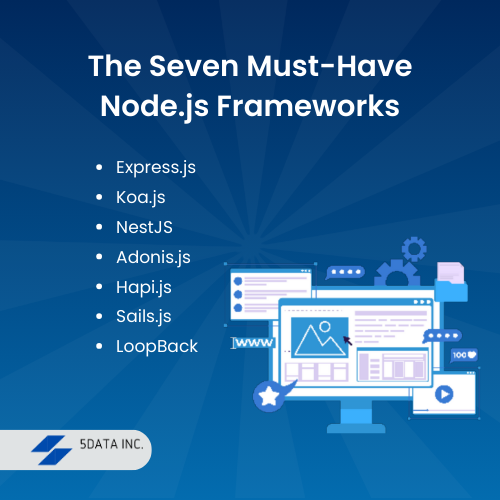The escalating demand for web applications as the cornerstone of contemporary business endeavors has witnessed exponential growth in recent years. In response, developers have diligently explored diverse frameworks to empower the creation of web applications that deliver a seamless user experience and enhanced features. Upon meticulous analysis, it becomes abundantly clear that Node.js is the quintessential choice for back-end and full-stack developers.
Node.js is exceptionally capable of managing numerous connections concurrently through key mechanisms of non-blocking operations. Consequently, it has ascended to the zenith of popularity among programming languages for crafting real-time applications.
In the forthcoming discourse, we shall embark on a comprehensive exploration of Node.js frameworks, delving into their intricate arguments, substantial event-driven mechanisms, and, equally importantly, their succinct limitations.
What we cover in this blog
Understanding Node.js
Node.js is the driving force behind many of today’s real-time web applications. It’s a versatile cross-platform JavaScript runtime environment for creating online games, messaging apps, video platforms, and more. For example, Big tech companies like Paypal, LinkedIn, and Netflix rely on Node.js to build engaging user interfaces (UIs) and powerful server-side components.Node.js Framework(s)
Node.js frameworks are like handy toolkits created by the Node.js developer community and ecosystem to make software development easier. They save time, such as Node Package Manager, the giant online repository of the Node.js back-end framework, making things faster and easier. Not all Node.js frameworks are the same, though. They have unique strengths, so picking the right one depends on your application development requirements.Types Of Node.js Frameworks
Node.js frameworks can be categorized into three main types based on their support for different stages in the web development process:- MVC (Model-View-Controller): MVC frameworks follow a specific design pattern that divides the application’s logic into three interconnected components: models, views, and controllers. This separation allows for a more organized approach, where the business logic and the user interface are distinct, resulting in improved scalability and easier application maintenance.
- Full-Stack MVC: Full-stack MVC frameworks provide a comprehensive set of tools for building both the front-end and back-end of applications. They streamline the development process by eliminating the need to work with multiple frameworks. Additionally, they offer various capabilities such as libraries, scaffolding, template engines, and more, enabling developers to create a fully developed user interface.
- REST API: REST API frameworks are designed to facilitate fast and flexible development using REST APIs. These APIs enable seamless communication between the client and server, making it easy for developers to incorporate additional functionalities into their applications. This approach is particularly useful for building web services and APIs that interact with various client applications.
The Seven Must-Have Node.js Frameworks
Qualified software developers developed a top-notch enterprise Nodejs framework that is asynchronous, event-driven, and uses a single thread to manage HTTP requests. The best feature of these different frameworks is that they all are scalable and work across the cross-platform, which efficiently improves the speed and versatility of the website and systems.1. Express.js:
Express.js is a minimalist and highly flexible Node.js web application framework. Features:- Lightweight and easy to use.
- Extensive middleware support for adding enhancements and easy customization.
- Ideal for building RESTful APIs and web programs.
- Quick and straightforward development.
- Strong community support and a wealth of documentation.
- Wide range of available plugins and modules.
- It can become complex for large-scale applications.
- Fewer built-in features compared to some other framework(s).
2. Koa.js:
Koa.js is a modern, lightweight framework for building web applications and APIs. Features:- Utilizes async/await for cleaner and more readable code.
- Minimalist design that allows developers to add only the desired middleware.
- Excellent support for error handling and generator functions.
- Enhanced performance due to its lightweight nature.
- Improved code organization and versatility.
- Built by the creators of Express.js, ensuring reliability.
- Smaller ecosystem compared to Express.js.
- The learning curve for developers new to asynchronous and other utilities.
- Achieve compatibility in hybrid javascript projects with the top mobile application development company.
3. NestJS:
NestJS is a progressive Node.js framework for building scalable and maintainable server-side applications. Features:- Utilizes TypeScript for strong typing and enhanced tooling.
- Modular architecture using decorators for easy configuration.
- Built-in support for microservices and GraphQL.
- Strongly typed, making it less error-prone.
- Highly modular and follows best practices for code structure.
- Active community and extensive documentation.
- The learning curve for developers unfamiliar with TypeScript.
- It’s a slightly more complex setup compared to simpler frameworks.
4. Adonis.js:
Adonis.js is a full-featured MVC framework for Node.js that simplifies web application development. Features:- Follows the MVC pattern for structured development.
- Built-in authentication, ORM, and other essential library modules.
- Increased scalability for building both simple and complex internet applications.
- Batteries-included approach reduces development time.
- Suitable for both beginners and experienced developers.
- The learning curve for those new to MVC architecture.
- Heavier than minimalist frameworks like Express.js.

5. Hapi.js:
Hapi.js is a powerful framework known for its configuration-centric approach, which can handle large amounts of traffic across applications and services. Features:- Emphasis on configuration and extensibility.
- Built-in support for validation, authentication, and caching.
- Well-suited for developing RESTful APIs and real-time applications.>/li>
- Exceptional configuration options for precise control.
- Strong security features and robust testing capabilities.
- Used by major companies like Walmart and PayPal for compatibility and generating revenue.
- Configuration-centric approach may feel verbose.
- The learning curve for developers accustomed to other frameworks.
6. Sails.js:
Sails.js is a real-time MVC framework for building data-driven applications. Features:- Full-featured MVC architecture for structured development.
- Real-time javascript functionalities with WebSocket support.
- Auto-generated REST APIs based on data models.
- Speeds up development with automatic library generation.
- Excellent for building real-time and collaborative apps.
- The learning curve for developers new to MVC or real-time concepts.
- It’s not as lightweight as minimalistic frameworks like Express.js.
7. LoopBack:
LoopBack is a highly extensible Node.js framework for creating REST APIs and microservices. Features:- Strong emphasis on creating APIs and microservices quickly.
- Built-in API explorer for easy testing and documentation.
- Supports various data sources, including databases and REST services.
- Rapid API development with minimal coding.
- Excellent support for connecting to various data sources.
- Robust security features, including role-based access control.
- Primarily geared toward API development, it may not suit all use cases.
- The steeper learning curve when customizing complex APIs.
Conclusions
Also note that many other Node.js frameworks are available, and they all have fantastic features. Some of our top picks were these. Every javascript framework supports the requirements of various client modules and in-built libraries. Therefore, it is up to us to pick the framework that best addresses your concerns. Supercharge your software applications with the best application development services in the USA. Hurry! Contact us today to learn more…
About the Author...
Almaas Saleem is a skilled software engineer from Kerala, India who currently resides in East Africa. She is passionate about technology and constantly seeks to learn more about it through reading and hands-on experience. Almaas excels in web development, design, automated testing software, ethical hacking, cybersecurity, and digital marketing. She also works as a technical writer for new businesses, managing various entities. Almaas is distinguished by her steadfastness and commitment to her work, which consistently yields excellent results.
